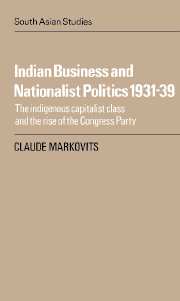 Indian Business and Nationalist Politics 1931–39
Indian Business and Nationalist Politics 1931–39 Book contents
- Frontmatter
- Contents
- Preface
- Abbreviations
- Introduction
- 1 Indian capital
- 2 Crisis and opportunities
- 3 Business, Civil Disobedience and the reforms 1931–1935
- 4 The turning point: capitalists and Congressmen 1935–1937
- 5 Business, the central government and the Congress 1937–1939
- 6 Indian business and the Congress provincial governments 1937–1939
- Conclusion
- APPENDICES
- Biographical notes
- Bibliography
- Glossary
- Index
3 - Business, Civil Disobedience and the reforms 1931–1935
Published online by Cambridge University Press: 25 October 2009
- Frontmatter
- Contents
- Preface
- Abbreviations
- Introduction
- 1 Indian capital
- 2 Crisis and opportunities
- 3 Business, Civil Disobedience and the reforms 1931–1935
- 4 The turning point: capitalists and Congressmen 1935–1937
- 5 Business, the central government and the Congress 1937–1939
- 6 Indian business and the Congress provincial governments 1937–1939
- Conclusion
- APPENDICES
- Biographical notes
- Bibliography
- Glossary
- Index
Summary
Between 1927 and 1934 a direct confrontation opposed Indian nationalism and British imperialism. It culminated in the two successive Civil Disobedience movements of 1930–1931 and 1932–1934 separated by a truce which lasted from March 1931 to January 1932. Following the abandonment of Civil Disobedience by the Congress in April 1934 there was a return to constitutional politics, and the reformed Constitution adopted by the British Parliament in August 1935 redefined the rules of the political game. These were years of turmoil during which the political resources of Indian businessmen were put under heavy strain, leading to an open split in their ranks. In this chapter, attention will be focused primarily around the origins and course of such a split. Although the detailed story will be taken up only from the time of the Gandhi–Irwin pact of March 1931, an analysis of the trend during the 1927–1931 period is necessary to an understanding of subsequent events.
Indian business, the Congress and the Raj November 1927–March 1931
The direct confrontation between the Congress and the Raj was sparked off in November 1927 by the visit of the Indian Statutory Commission. While political tension was mounting, the relations between the government and Indian big business were also reaching their lowest ebb for many years. This deterioration was due to several causes – the obstinate refusal of the government to devalue the rupee in spite of an active campaign for devaluation launched by Indian business circles, the continuing conflict around the reservation of coastal traffic to Indian shipping companies and the rejection by the government of the recommendations in the report of the 1927 Indian Tariff Board for a rise in the duty on imported cotton goods.
- Type
- Chapter
- Information
- Indian Business and Nationalist Politics 1931–39The Indigenous Capitalist Class and the Rise of the Congress Party, pp. 68 - 100Publisher: Cambridge University PressPrint publication year: 1985


